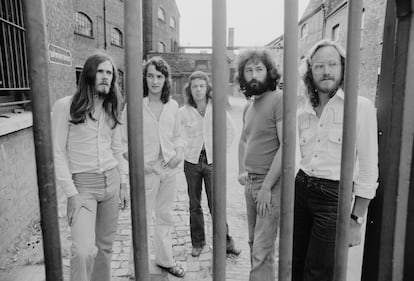He has left as he lived, without making too much noise. The discreet Rick Davies, the Antiestrella del Rock, co -founder, singer and composer of the English band Supertramp, has died at age 81 at his home in Long Island (New York) “After a long illness,” according to the band itself. Davies was the Supertramp leader with Roger Hodgson. The group obtained its greatest success level with the album Breakfast in Americaof 1979.
Davies was diagnosed with cancer in 2015 and since then he almost ceased his activity with Supertramp, although, once the aggressive phase of the disease was overcome, he liked to act in small clubs near his residence, where he played the piano and sang themes of rhythm & blues, His passion. Although the most commercial themes of the group composed them and sang Hodgson (Give a Little Bit, The Logical Song, Dreamer), Some songs by Davies also sounded on the radios with insistence, such as Goodbye Stranger, Take the Long Way Home o Bloody Well Right.
Born in Swindon (United Kingdom) in 1944, Davies was interested in music from a young age. First he trained as drummer and then as a keyboardist. In 1969 he published an announcement looking for musicians to join his new band, to which Hodgson replied. After a brief period acting as Daddy, he changed his name to Supertramp. The group always wielded an atypical biography since its inception. Davies obtained the economic support of a Dutch wealthy, Stanley August Miesegaes (friendly called Sam), who fell in love with the musicist’s music.
The first two works of the group paid Sam’s pocket: Supertramp, of 1970, e Indelibly Stamped, of 1971. The little commercial impact of both disappointed the patron, which stopped paying the band’s invoices. Davies and Hodgson trusted their project, but they found themselves in a bankruptcy situation almost at the beginning. The two young musicians played everything to a new album. If it failed, the best thing would be to break the band and dedicate energies to other projects. From this pressure, perhaps his most compact work came out, Crime of the Century (1974). Here the strengths of the group are already beginning to be perceived: seasoned instrumentalists and talent to elaborate accessible melodies, against the progressive rock brain of the time. It was also the album that showed the difference in style between leaders. Davies preferred the elaborated structures, based on piano and inclination towards blues; Hodgson belonged to the Beatles school, sunny vocal harmonies and a commerciality point. “There were two absolutely different, antagonistic personalities,” said the bassist, Dougie Thomson, to El País in 2023. They signed the songs together, but worked separately.
Their divergences were not limited to the musical. In personality they collided: Davies, of the working class, declared was pragmatic; Hodgson, from a accommodated environment, acting as spiritual and idealistic. The first was carnivore; The other, vegetarian. The serious problems, however, would take to arrive. The discs Crisis? What Crisis? (1975) y Even in the Quietest Moments… (1977) settled the English group commercially and moved to the United States, a much more lucrative market than the European.
Mass success came with Breakfast in America (1979), an album that reached number one sales in many countries, including Spain. Up to four single were extracted, but it could have been some more. Supertramp was the group of the moment and its themes passed intensely through the radio stations. It is, without a doubt, its most commercial work, something that the musical press did not like, which criticized its premeditated intention to sell. The strenuous tour of this album dramatically distanced the two leaders. They entered the game to reproach their differences in the songs. While Davies wrote Casual Conversations denouncing how complicated it was to communicate with Hodgson, he replied with Child Of Visionwhere he exposes the materialistic life that Davies had adopted.
Years later, Hodgson explained the ambient temperature of Supertramp in 1980: “I had the impression that the band was disintegrating. In those mass concerts I felt like a kind of actor making the same representation night after night. We had become slaves of a great production.” Finally, In 1983, Hodgson left the group to start a solo race. A pact was reached: Hodgson left Davies to continue as Supertramp on the condition that he did not touch his songs. That was too much: it meant dispensing with School, Breakfast In America, The Logical Song o Give a Little Bit. The agreement lasted a few months, until Davies fed up that the public asked for those issues at concerts. For almost four decades the group lived among tensions, even with judicial demands by the other musicians of classical training, who demanded that Davies exploit the copyright of the songs in which they had participated.
There were also reconciliation attempts, but up to three times they were frustrated at the last moment. Both Davies and Hodgson have been interpreting the topics of Supertramp separately, keeping a repertoire that still occupies space in classic rock stations still today.

